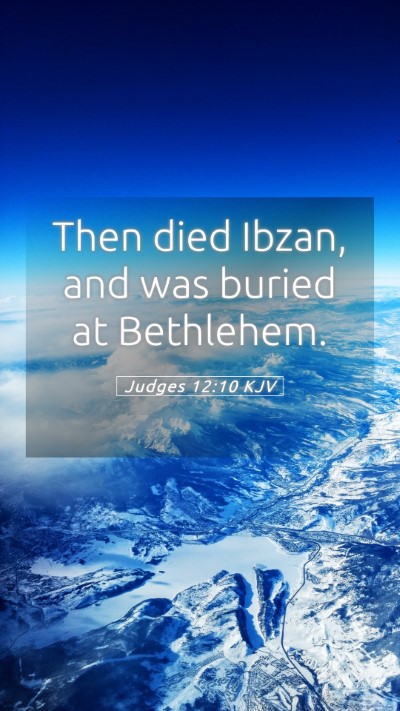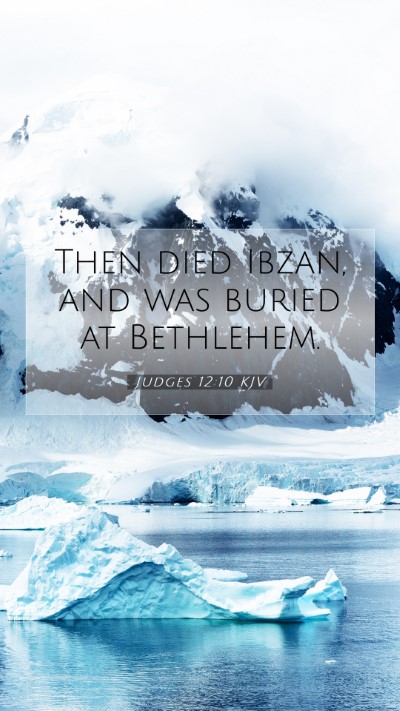Old Testament
Genesis Exodus Leviticus Numbers Deuteronomy Joshua Judges Ruth 1 Samuel 2 Samuel 1 Kings 2 Kings 1 Chronicles 2 Chronicles Ezra Nehemiah Esther Job Psalms Proverbs Ecclesiastes Song of Solomon Isaiah Jeremiah Lamentations Ezekiel Daniel Hosea Joel Amos Obadiah Jonah Micah Nahum Habakkuk Zephaniah Haggai Zechariah MalachiJudges 12:10 Meaning
What is the meaning of Judges 12:10?
Then died Ibzan, and was buried at Bethlehem.
Judges 12:10 Bible Verse Meaning
Understanding Judges 12:10
Judges 12:10 states: "And Jephthah died, and was buried in one of the cities of Gilead." This brief yet significant verse encapsulates the final moments of Jephthah's life and reflects on his role as a judge of Israel. Below, we will explore the meaning of this Bible verse through the lenses of various public domain commentaries, providing insights into its significance for modern readers.
Verse Meaning and Interpretation
-
Matthew Henry's Commentary:
Matthew Henry emphasizes the brevity of Jephthah's life and the tragic end of his leadership. He suggests that while Jephthah was a deliverer of Israel, his story is a reminder of human frailty and the impermanence of earthly achievements. His life serves as a testimony to the complex character of those God chooses to lead His people, demonstrating both strength and vulnerability.
-
Albert Barnes' Notes:
Albert Barnes notes that Jephthah's death in Gilead indicates a return to his roots, as he was originally from that region. This reflects the cycle of leadership and the importance of remembering where one comes from. Barnes highlights that Jephthah's dying in Gilead also signifies the end of a significant chapter in Israel's history, marking a transition that invites reflection on God's providence through difficult times.
-
Adam Clarke's Commentary:
Adam Clarke focuses on the implications of Jephthah's actions during his judgeship, emphasizing his commitment to serving Israel despite personal sacrifices. Clarke interprets Jephthah's burial in Gilead as an act of honor, suggesting that he was respected by his fellow Israelites. Clarke points out that Jephthah’s complex legacy invites readers to ponder the nature of leadership and the responsibilities that come with it.
Key Themes and Applications
The Bible verse commentary on Judges 12:10 provides valuable insights that can be applied to our understanding of leadership, legacy, and God's purpose. Some themes include:
- The Nature of Leadership: Jephthah's story reflects both the triumphs and trials of leadership. As we study this verse, we are reminded that leaders are often shaped by their experiences and the choices they make.
- Legacy and Memory: Jephthah's burial in Gilead signifies that how one is remembered is tied to their actions and character. This prompts readers to consider what kind of legacy they want to leave behind.
- God's Sovereignty: Jephthah’s life and death demonstrate that God can use even imperfect individuals to fulfill His plans. This offers hope that our shortcomings do not disqualify us from serving God's purposes.
Cross References
Understanding Judges 12:10 also invites us to explore related scripture passages that deepen our insights:
- Judges 11:1-11 - Discusses Jephthah's background and his call to lead Israel.
- Judges 11:30-31 - Highlights the vow Jephthah made, leading to significant implications in his life.
- Romans 15:4 - Reflects on the importance of the scriptures for instruction and encouragement.
Conclusion
In conclusion, exploring the meaning of Bible verses like Judges 12:10 requires a careful examination of both the text and its historical context. This analysis encourages deeper Bible study insights and a more profound understanding of how Scripture applies to our lives today. As we engage in online Bible study or with Bible study groups, let us reflect on these insights to enrich our spiritual journeys.


